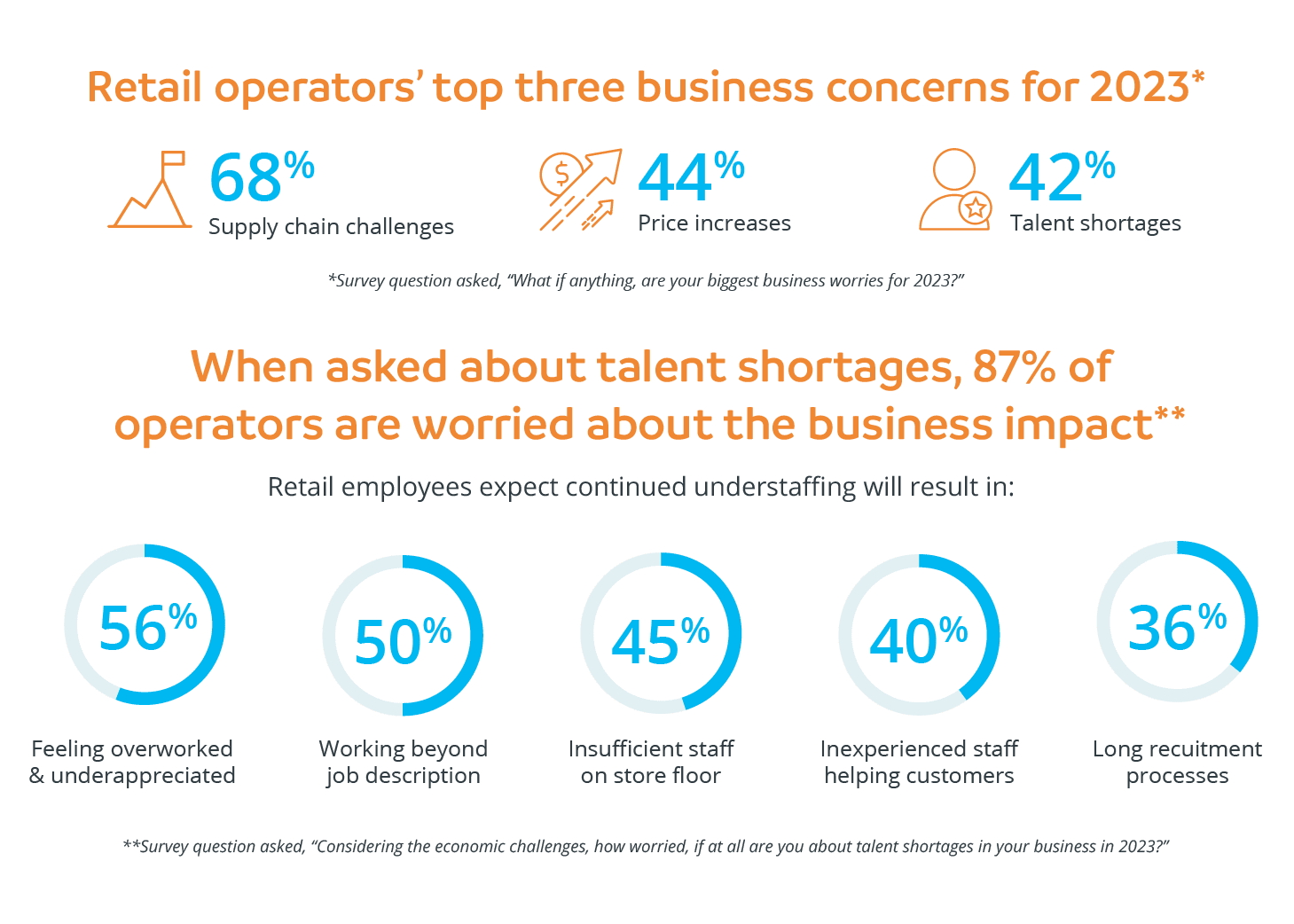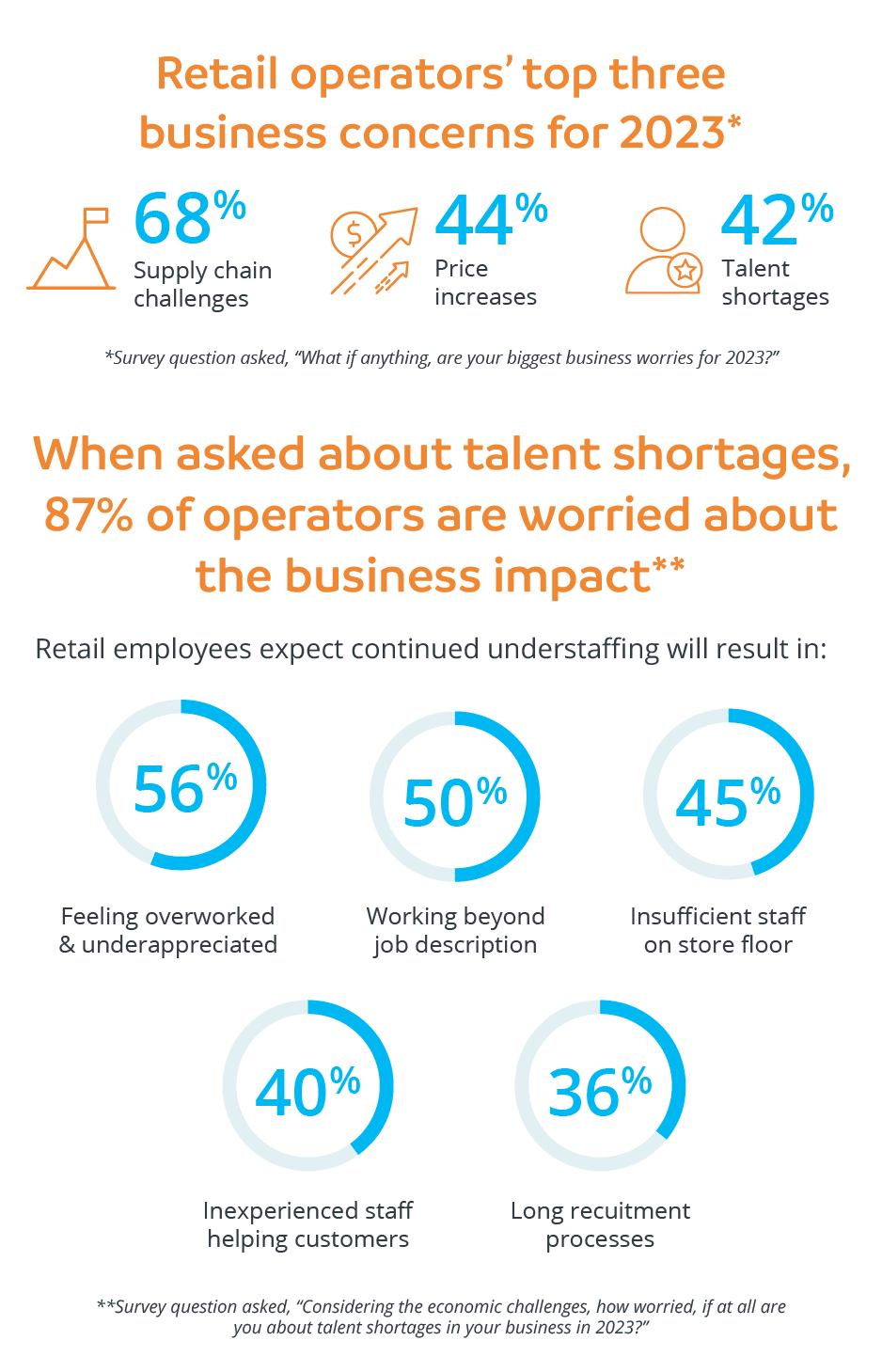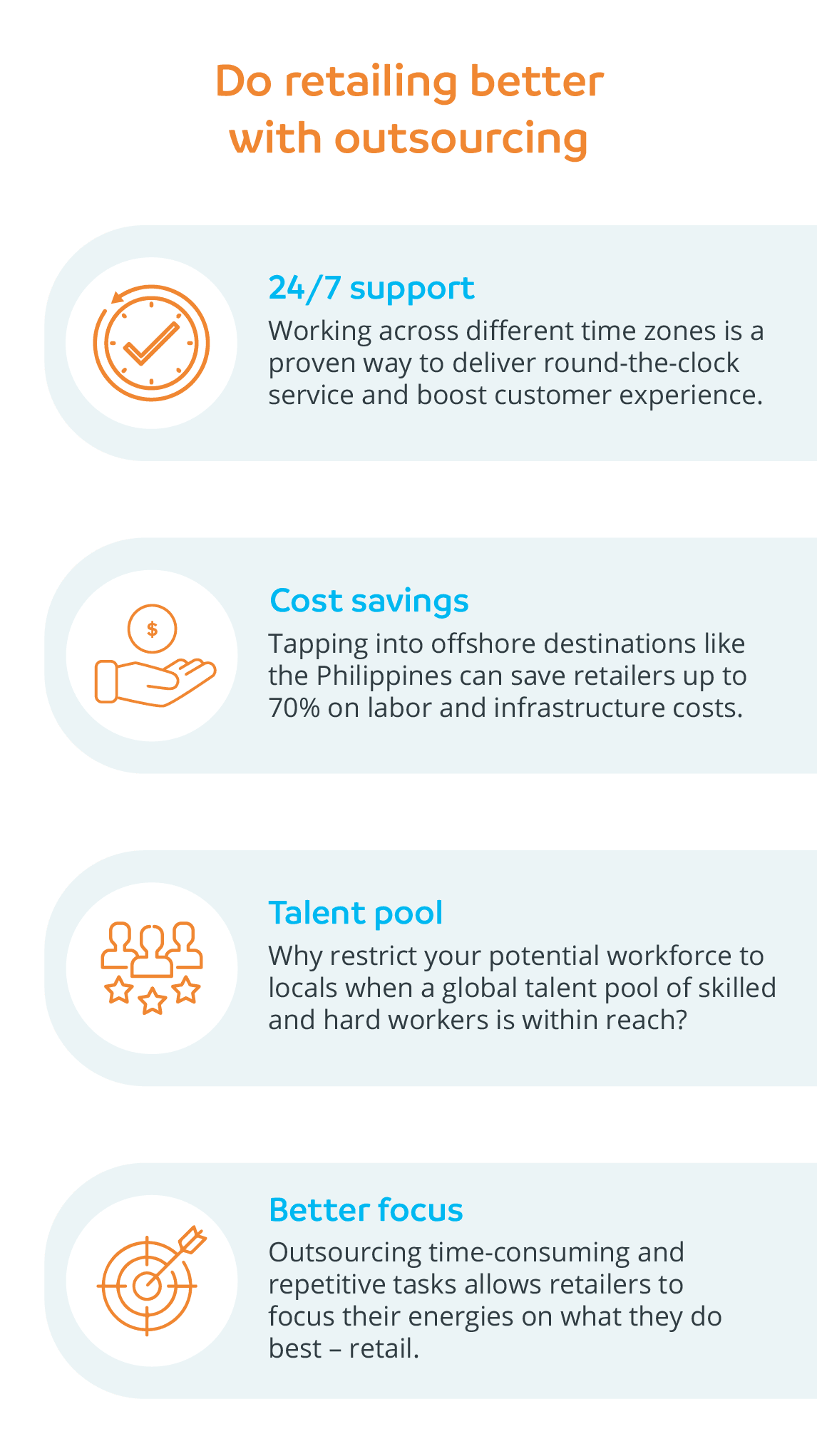Why outsourcing in retail is a winning strategy
Not so long ago, ‘Big Four’ accounting firm Deloitte accepted the challenge of checking the pulse of the retail sector. Having shown remarkable resilience in emerging from the chaos of the COVID-19 pandemic, businesses now found themselves battling market volatility, labor pressures and supply chain constraints and Deloitte wanted to explore how they planned to navigate the new challenges beyond traditional cost-cutting.

The result was the 2023 Retail Industry Outlook, a study based on interviews with 50 leaders that provided an in-depth outlook on how they felt about the current market and their strategies for driving future success. Among many findings, only a third of retail executives said they were very confident about maintaining or improving profit margins in what they expected to be turbulent times[1], pointing to factors such as inflation and reduced consumer spending.
Such concerns are supported by the likes of Foot Locker and Dick’s Sporting Goods recently cutting annual profit forecasts[2] and department store giant Macy’s warning of “weak demand and a faster-than-expected rise in credit card payment delays”[3]. It is a similar story for many eCommerce brands that thrived in the boom times of the pandemic but are now being warned to “forget the business-as-usual” and take a new approach to how they operate to “stand a better chance of surviving this tumultuous period”[4].
Amid such uncertainty, an increasing number of retail and eCommerce businesses are turning to a resourcing strategy that has been proven time and again to increase efficiencies, boost productivity and ease financial pressures. That strategy? Outsourcing.


What is outsourcing in retail?
Outsourcing in retail is the process of partnering with an external provider to perform tasks that would normally be completed by an in-house employee. By outsourcing certain business functions, retailers can free up resources to focus on core competencies and scale up and down depending on market conditions. The range of tasks that can be outsourced are diverse and partnering with quality offshore providers can save businesses up to 70% on labor costs.
What retail or eCommerce tasks can be outsourced?
The first priority when implementing an outsourcing strategy is to consider what tasks are best suited to being handled by an offshore employee or team. In the retail and eCommerce sector, options include:
- Content marketing: modern retail is all about eyeballs and, more specifically, attracting as many of them to one’s website, app or physical store. This is where content comes into play, with quality words, images, videos and posts all part of the recipe for driving traffic and growing a brand. Turning browsers into buyers is a unique skill and many retail and eCommerce businesses appreciate the benefits of outsourcing the creation of blogs, infographics and social media management to experts, thus allowing them to focus on what they do best.
- IT and web development: gone are the days when retailers could get by handling their IT needs on their own or getting a tech-savvy friend or family member to create an acceptable website. The boom in online shopping and demand for omnichannel solutions means retail businesses cannot afford to drop the ball on digital and that is why more operators are investing in outsourced IT support and web developers. As highlighted by news site Retail Dive: “The digital transformation has taken hold over the last few years … and for many in-house teams, it’s become too much to handle.”[5]
- Administration: retailers love nothing more than identifying and sourcing great products, building relationships with customers and, of course, making sales. What many don’t love is being forced to spend countless hours on repetitive and mundane back-office tasks such as bookkeeping, HR and order management. Outsourcing administrative tasks is a quick and simple way for retail businesses to free up resources, save on labor costs and, most importantly, ensure more time to spend doing what they do best.

What are benefits of outsourcing in retail?
No two retailers are the same so it makes sense that every business has its own reasons for outsourcing. However, the good news is that seeking one benefit inevitably leads to finding plenty more including:
- Reduced costs: it is no surprise studies show that 70% of companies cite ‘cost reduction’ as a motivation to outsource[6]. Easing financial pressure is critical at the best of times, let alone in the current economic climate, and engaging an offshore service provider in a destination such as the Philippines can save up to 70% on labor and operating costs.
- Increased efficiencies: in a Western world where many business owners bemoan the lack of drive shown by employees, the level of commitment and enthusiasm shown by offshore staff is a welcome relief. Outsourcing time-consuming or specialist tasks to highly qualified individuals has continually been proven to increase quality and improve efficiencies.
- 24/7 support: a strong online presence is a must for modern-day retailers, which in turn creates the need to provide round-the-clock customer service. While operating a 24/7 in-house service may be logistically or financially impractical, offshore partners in different time zones can make it a reality and play a significant role in bolstering customer service.
Summary
The modern retail eCommerce environment is too competitive and challenging to go it alone. From global giants such as Walmart and Amazon to niche operators and aspiring start-ups, countless retailers are benefiting from partnering with quality outsourcing providers that are committed to helping them reach their goals and sustain their growth potential. If you want your business to join them on that upward trajectory, now is the time to find the offshore solution that works best for you.
Fast-evolving technology is changing the world of eCommerce for the better. Discover how chatbots and conversational AI are boosting sales, improving customer retention and mitigating the lack of physical retail assistants in online stores.
Reference:
[1] 2023 Retail Industry Outlook | Deloitte US
[2] Foot Locker Plummets, Drags Down Peers, on Forecast Cut | BoF (businessoffashion.com)
[3] Gloomy U.S. retail outlook dulls hopes of strong holiday season spending | Reuters
[4] How e-commerce scaleups can survive economic uncertainty in 2023 - Figaro Digital
[5] Why more and more retailers are outsourcing their IT | Retail Dive
[6] 10 Outsourcing Statistics and Why They Matter - NearShore Technology
Popular posts
Browse by topic
- Accounting
- Accounting & Finance
- All Industries
- Banking
- BPO/RPO/HRO
- Communication
- CSR & ESG
- Customer & Client Acquisition
- Customer Experience
- Cybersecurity
- Cybersecurity & Compliance
- Data Management
- Digital Operations
- Digital Transformation
- eCommerce
- Education
- Employee Engagement
- Engineering & Construction
- Financial Services
- Healthcare
- Hospitality and tourism
- HR & Recruitment
- Information Technology
- Insurance
- Legal Services
- Logistics
- Offshoring & Outsourcing
- Outsourcing
- Professional Services
- Real Estate
- Retail & eCommerce
- Startups
- Talent Acquisition and Retention
- Technology
- Trends & Guides
- Workforce Integration
Sign up for the offshoring eCourse
12 in-depth and educational modules delivered via email – for free
Related Posts
Is offshore staffing the key to data compliance?
With entire websites dedicated to exposing businesses daily that have been hacked or have had their data breached daily, it’s no wonder why data..
The ultimate guide to outsourcing data processing services
For more than a century, Harvard Business Review has been a go-to resource for managers wanting insights into topics such as leadership, negotiation,..
How to outsource health information management (HIM)
What is outsourced health information management (HIM)?
